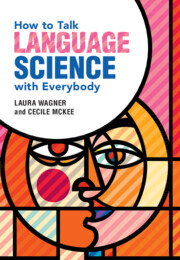Book contents
- How to Talk Language Science with Everybody
- How to Talk Language Science with Everybody
- Copyright page
- Contents
- Figures
- Preface
- Acknowledgments
- 1 Why Bother?
- 2 You Can Be the Expert
- 3 Cooperative Conversations
- 4 Conversational Goals
- 5 Know Your Audience
- 6 Creating Relevance by Generating Interest
- 7 Creating Relevance by Making Connections
- 8 Quality and Credibility
- 9 Quality vs Quantity
- 10 Learn to Listen
- 11 Information Structure
- 12 The Curse of Knowledge
- 13 Start with Examples
- 14 What’s New?
- 15 From Given to New
- 16 The Three-Legged Stool Approach
- 17 Working with a Range of Different Audiences
- 18 Where Can I Go?
- 19 Being a Good Partner
- 20 Finale
- Appendix Teaching with This Book
- References
- Index
11 - Information Structure
Published online by Cambridge University Press: 17 May 2023
- How to Talk Language Science with Everybody
- How to Talk Language Science with Everybody
- Copyright page
- Contents
- Figures
- Preface
- Acknowledgments
- 1 Why Bother?
- 2 You Can Be the Expert
- 3 Cooperative Conversations
- 4 Conversational Goals
- 5 Know Your Audience
- 6 Creating Relevance by Generating Interest
- 7 Creating Relevance by Making Connections
- 8 Quality and Credibility
- 9 Quality vs Quantity
- 10 Learn to Listen
- 11 Information Structure
- 12 The Curse of Knowledge
- 13 Start with Examples
- 14 What’s New?
- 15 From Given to New
- 16 The Three-Legged Stool Approach
- 17 Working with a Range of Different Audiences
- 18 Where Can I Go?
- 19 Being a Good Partner
- 20 Finale
- Appendix Teaching with This Book
- References
- Index
Summary
Chapter 11 opens by asking readers to imagine what different kinds of people likely know and don’t know. For example, everyone knows that things fall when you drop them. But details of social etiquette and childhood memories will vary across people. This exercise relates to the Maxim of Manner, which focuses on brevity, clarity, and orderliness for contributions to successful conversations. Information structure is central here: Learning is enhanced when learners meet given or familiar information before new or unfamiliar information. In other words, we build on what we already know. One reason that this point is critical to public engagement is that we compute meaning for words and sentences as we hear/read them. The Worked Example uses a demonstration in which we write people’s names in the International Phonetic Alphabet to compare two orders for presenting critical information. This chapter’s Closing Worksheet asks readers to write down an ideal interaction they want with the demonstrations they are developing and then to change the order of the elements around.
Keywords
Information
- Type
- Chapter
- Information
- How to Talk Language Science with Everybody , pp. 129 - 137Publisher: Cambridge University PressPrint publication year: 2023
